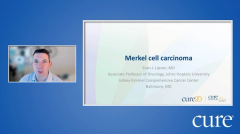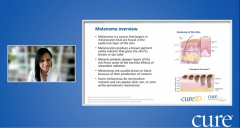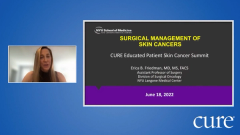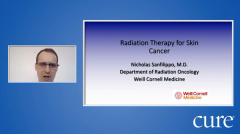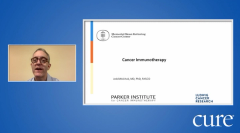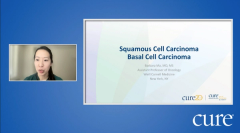
Educated Patient® Skin Cancer Summit Integrative Care Presentation: June 18, 2022
Watch Lorenzo G. Cohen, from The University of Texas MD Anderson Cancer Center, discuss integrative care during the CURE Educated Patient Skin Cancer Summit.
For some patients with skin cancer, incorporating integrative medicine approaches along with conventional treatment may ease side effects and improve quality of life, according to an expert.
Lorenzo G. Cohen, professor and director of the Integrative Medicine Program at The University of Texas MD Anderson Cancer Center in Houston, discussed the topic of integrative medicine and how it can be beneficial for patients further at the CURE® Educated Patient® Skin Cancer Summit.
Cohen explained that integrative medicine is an approach to treating patients, alongside their treatments for the cancer, with non-conventional modalities in hopes to achieve pain/ side effect relief, better lifestyle and all-around improved quality of life.
“It’s a purposeful evidence-based approach to safely incorporate complementary modalities and lifestyle alongside conventional care,” he said in an interview with CURE®.
He further explained that when deciding what integrative medicine to incorporate would depend on the type of person a patient is and what they are looking to get out of it. The different types he discussed included supplements or vitamins, special diets, acupuncture, massage therapy, meditation, yoga and physical activity.
Incorporating integrative approaches like these may help patients manage some symptoms they may experience such as fatigue, nausea, neuropathy and mood-related issues. For example, acupuncture has been shown to be effective in easing symptoms for women with skin cancer who are experiencing hot flashes during menopause, he said.
Additionally, some patients with melanoma might be treated with immunotherapy, which can directly impact their diet, he explained, but with a diet high in fiber they may respond better to treatment.
“We know that things like diet, exercise … innervate different biological processes that will help to make our body less hospitable to cancer growth and activating processes that will keep the cancer in control,” he added.
Incorporating things such as yoga, exercise, diet and acupuncture during conventional treatment is not concerning, Cohen said. However, taking an herb or supplement during treatment could have a different interaction, so it is important for patients to talk with health care professionals to help guide them through the supplement integration safely.
He added that there is a lot of misinformation available which may harm patients, so it is important for them to stay educated.
“People through searching the internet will come upon somewhat unscrupulous websites that are trying to sell something that at best is just a waste of money and worse it could actually be harmful because of containments that could be in the products and there could be a negative side effect,” Cohen explained.
However, integrative medicine can still be safe and improve quality of life for some patients. Cohen said there is a “tremendous” amount of evidence that demonstrates improved quality of life as well as clinical outcomes for patients who incorporate integrative medicine approaches during treatment.
For more news on cancer updates, research and education, don’t forget to

